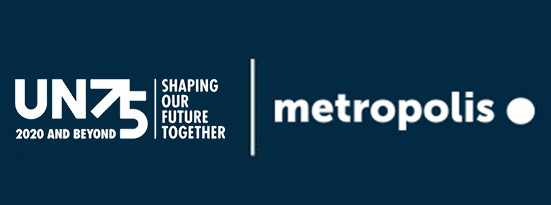INTERNATIONAL
CALENDAR
CALENDAR

Metropolis debate: The place of Metropolitan Spaces within the Future of Multilateralism
Context and objectives of the session
On the occasion of the 75th Anniversary of the United Nations, the UN Secretary-General has launched a global conversation on the role of global cooperation in building our future. He considers this consultation a milestone to capture the views of the global public and stakeholders from all sectors on the future of multilateralism and its role in managing global trends, including climate change, changing demographics, new technologies and inequalities. Upon request of the United Nations, UCLG has committed to facilitate a Report on the vision of local and regional leaders of the challenges ahead, the future we imagine, and an inclusive and networked multilateral system that is fit for purpose to meet these aspirations.
Major metropolises are globally connected and they have the ability to structure and galvanise the territories around them at a local, national and regional scale. However, metropolitan areas must also address serious threats. The inequalities between and within metropolitan areas are intensifying. The increasing pressure to achieve economic growth and competitiveness is giving rise to negative externalities that are having an adverse impact on sustainable urban development. In almost every metropolis around the world, it is possible to see growing social segmentation, which translates into varying forms of gentrification such as segregation in housing and in the labour market, as well as the ghettoization of the most vulnerable communities, and the increase of the gender gap.
Our planet has been advancing towards a metropolitan era characterised by major conurbations of unprecedented complexity and diversity. The outcome of the convergence of global and metropolitan challenges is a significant part of the current global agendas linked to sustainable development focus on large conurbations and have a decisive impact on the policies that are implemented. Consequently, metropolitan areas are the setting in which some of the planet’s most pressing problems can be solved. However, the current pandemic is confronting city leaders and the global community to some of the pre-existing critical contradictions of large urban areas and urges local governments and the global community to stand up and act.
In this context, Metropolis organises an on-line debate on May 25th from 3:00 to 4:30 pm (CET time) to provide participants with:
-
Inputs and key-drivers to global questions.
-
A long-term perspective on the future we want for metropolitan areas and the world.
-
The connections between global governance and metropolitan governance.
Speakers will be requested to share their views around the following questions:
-
Which are the key issues being faced both at the metropolitan level and at the global one?
-
What kind of system is fit for purpose to be able to accelerate implementation and achieve the global goals?
-
What is the new model of governance that allows us to achieve the localization of the goals that we committed to?
-
How would we like to adapt our governance models to the interconnected future?
-
Are cities and metropolitan areas seeing and imagining themselves as the spaces in which transformation is taking place?
Interpretation will be available in French, Spanish, and English.
To participate in the session, please register here
Agenda
Opening (5’): Octavi de la Varga, Metropolis Secretary General
Setting the scene (10’): Emilia Saiz, UCLG Secretary General
An overview of multilateralism and local governments (15’): Laia Bonet, Barcelona City Council Deputy Mayor for Agenda 2030, Digital Transition, Sports and Territorial and Metropolitan Coordination.
Debate (55‘):
-
Henri-Paul Normandin, International Relations Director of Montreal and former ambassador of Canada to the UN.
-
Ana Falú, Chair of the UN-Habitat Advisory Board, UCLG Ubuntu Advisor and former Regional Director of UN-Women for South American countries. Emeritus Professor UNC - Argentina
-
Aromar Revi, Director of the Indian Institute for Human Settlements and UCLG Ubuntu Advisor
-
Moderated by Octavi de la Varga
Open discussion with the audience (15’)
Wrap up (10’):
-
Paola Arjona, Technical Director of AL-LAS
-
Agustí Fernández de Losada, Director of the CIDOB Global Cities Programme
With the support of:


